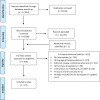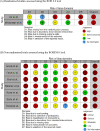Non-pharmacological interventions for the prevention of sexually transmitted infections (STIs) in older adults: A systematic review
- PMID: 37224103
- PMCID: PMC10208510
- DOI: 10.1371/journal.pone.0284324
Non-pharmacological interventions for the prevention of sexually transmitted infections (STIs) in older adults: A systematic review
Abstract
Background: STIs in older adults (adults aged 50 years and older) are on the rise due to variable levels of sex literacy and misperceived susceptibility to infections, among other factors. We systematically reviewed evidence on the effect of non-pharmacological interventions for the primary prevention of sexually transmitted infections (STIs) and high-risk sexual behaviour in older adults.
Methods: We searched EMBASE, MEDLINE, PSYCINFO, Global Health and the Cochrane Library from inception until March 9th, 2022. We included RCTs, cluster-randomised trials, quasi-RCTs, interrupted time series (ITS) and controlled and uncontrolled before-and-after studies of non-pharmacological primary prevention interventions (e.g. educational and behaviour change interventions) in older adults, reporting either qualitative or quantitative findings. At least two review authors independently assessed the eligibility of articles and extracted data on main characteristics, risk of bias and study findings. Narrative synthesis was performed.
Results: Ten studies (two RCTs, seven quasi-experiment studies and one qualitative study) were found to be eligible for this review. These interventions were mainly information, education and communication activities (IECs) aimed at fostering participants' knowledge on STIs and safer sex, mostly focused on HIV. Most studies used self-reported outcomes measuring knowledge and behaviour change related to HIV, STIs and safer sex. Studies generally reported an increase in STI/HIV knowledge. However, risk of bias was high or critical across all studies.
Conclusions: Literature on non-pharmacological interventions for older adults is sparse, particularly outside the US and for STIs other than HIV. There is evidence that IECs may improve short-term knowledge about STIs however, it is not clear this translates into long-term improvement or behaviour change as all studies included in this review had follow-up times of 3 months or less. More robust and higher-quality studies are needed in order to confirm the effectiveness of non-pharmacological primary prevention interventions for reducing STIs in the older adult population.
Copyright: © 2023 Co et al. This is an open access article distributed under the terms of the Creative Commons Attribution License, which permits unrestricted use, distribution, and reproduction in any medium, provided the original author and source are credited.
Conflict of interest statement
This review was commissioned and funded by the World Health Organisation (WHO). Authors RS, TW, and AP are affiliated with WHO. This does not alter our adherence to PLOS ONE policies on sharing data and materials.
Figures
Similar articles
-
Folic acid supplementation and malaria susceptibility and severity among people taking antifolate antimalarial drugs in endemic areas.Cochrane Database Syst Rev. 2022 Feb 1;2(2022):CD014217. doi: 10.1002/14651858.CD014217. Cochrane Database Syst Rev. 2022. PMID: 36321557 Free PMC article.
-
Behavioral Counseling Interventions to Prevent Sexually Transmitted Infections: A Systematic Evidence Review for the U.S. Preventive Services Task Force [Internet].Rockville (MD): Agency for Healthcare Research and Quality (US); 2020 Aug. Report No.: 19-05260-EF-1. Rockville (MD): Agency for Healthcare Research and Quality (US); 2020 Aug. Report No.: 19-05260-EF-1. PMID: 32970399 Free Books & Documents. Review.
-
Sexual behaviour and incidence of HIV and sexually transmitted infections among men who have sex with men using daily and event-driven pre-exposure prophylaxis in AMPrEP: 2 year results from a demonstration study.Lancet HIV. 2019 Jul;6(7):e447-e455. doi: 10.1016/S2352-3018(19)30136-5. Epub 2019 Jun 6. Lancet HIV. 2019. PMID: 31178284
-
Sexually active older Australian's knowledge of sexually transmitted infections and safer sexual practices.Aust N Z J Public Health. 2017 Jun;41(3):259-261. doi: 10.1111/1753-6405.12655. Epub 2017 Feb 28. Aust N Z J Public Health. 2017. PMID: 28245525
-
Effectiveness of text messaging interventions on prevention, detection, treatment, and knowledge outcomes for sexually transmitted infections (STIs)/HIV: a systematic review and meta-analysis.Syst Rev. 2019 Jan 8;8(1):12. doi: 10.1186/s13643-018-0921-4. Syst Rev. 2019. PMID: 30621784 Free PMC article.
Cited by
-
The trend analysis of HIV and other sexually transmitted infections among the elderly aged 50 to 69 years from 1990 to 2030.J Glob Health. 2024 Jul 19;14:04105. doi: 10.7189/jogh.14.04105. J Glob Health. 2024. PMID: 39026461 Free PMC article.
-
The prevalence trends of Trichomonas vaginalis infection among women in Jingzhou, central of China, 2019-2023.BMC Infect Dis. 2025 Mar 28;25(1):435. doi: 10.1186/s12879-025-10815-8. BMC Infect Dis. 2025. PMID: 40155817 Free PMC article.
-
From 'support' to 'separate': residential aged care staff responses to an intimate relationship involving a resident with cognitive impairment.BMC Geriatr. 2025 Apr 4;25(1):221. doi: 10.1186/s12877-025-05865-1. BMC Geriatr. 2025. PMID: 40186134 Free PMC article.
-
Sexual and reproductive health issues of women attending psychiatric clinic in India-A qualitative study.J Educ Health Promot. 2024 Feb 7;13:39. doi: 10.4103/jehp.jehp_857_23. eCollection 2024. J Educ Health Promot. 2024. PMID: 38545304 Free PMC article.
References
-
- World Health Organisation. Sexually transmitted infections (STIs) 2019 [Available from: https://www.who.int/news-room/fact-sheets/detail/sexually-transmitted-in....
-
- UK Health Security Agency. Sexually transmitted infections (STIs): annual data tables. s. r. Table 2: new STI diagnoses and rates by gender, age group and ethnic group, 2016 to 2020 2022 [Available from: https://www.gov.uk/government/statistics/sexually-transmitted-infections....
-
- Bodley-Tickell AT, Olowokure B, Bhaduri S, White DJ, Ward D, Ross JD, et al.. Trends in sexually transmitted infections (other than HIV) in older people: analysis of data from an enhanced surveillance system. Sexually transmitted infections. 2008;84(4):312–7. doi: 10.1136/sti.2007.027847 - DOI - PubMed
Publication types
MeSH terms
Grants and funding
LinkOut - more resources
Full Text Sources
Medical



